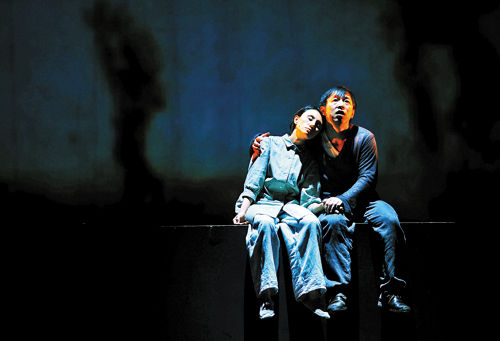Struggle to Live

|
|
Leading performers Huang Bo (right) and Yuan Quan.
|
The audience at the premiere night experienced a splendid performance of modern Chinese theater. Wolfgang T., a spectator from Halle, expressed what many felt this evening: “I’m really glad to have seen this play today. This trip to Berlin was more than worthwhile. This was world theater at its best. Bertolt Brecht would have been delighted!”
Mr. Jiang from Beijing said after the performance: “The play vividly portrays China’s dynamic history and the crushing burdens on Chinese people in the past. My wife and I were deeply moved.”
The play focused on a series of meaningful core scenes of the plot of the original novel: Xu Fugui, protagonist and son of a landowner, gambles away his family estate and risks the entire existence of his family. In complete poverty, Fugui is abandoned by his wife and little daughter, although both return to him later.
Fugui is conscripted by the Republican army and sent into the fight against Communist troops. He is captured, but eventually returns to his hometown.
Back home Fugui suffers further misfortunes, set against the backdrop of the most tumultuous decades of recent Chinese history. Fugui and his family experience the great tragedies of modern China.
During the steel-melting campaign in the 1950s, which was expected to boost China’s industrial strength, Fugui’s family – as everyone else at that time – is forced to give away even their last cooking pot. And, as if not enough, later on his son suddenly dies during a blood donation for a “higher ranking person.” It is more than an accident – the medical staff are unskilled and uncompassionate towards the lives in their trust.
In these tragic circumstances, Fugui loses first his son, then his wife, daughter and finally his beloved grandson. Misfortune seems to follow him like a dark shadow, although, in some rare moments, fortune smiles on him.
The last days of his life Fugui spends alone with an old stoic ox, in which he recognizes himself. “I named him Fugui after me, because we look alike,” he says. In the end, the protagonist’s will to live is the only thing that no one is able to take away from him.
Yu Hua and Meng Jinghui tell a touching parable of the capacity of suffering and the power of resistance of everyday Chinese people.
In a very natural but compelling way, the drama shows the differences between men and women in how they bear the grim burdens of that period of Chinese history. In face of misfortunes men drink, shout, and revolt. Women suffer too, but stoically, in silence.
Consequently, the audience remains stock-still when Fugui’s wife finally screams her anguish out to the world.
Without doubt the ironic hand of author Yu Hua is evident in every moment of Fugui’s story. Beyond the novel and continuing it, the play lays bare the folly and absurdity of human actions. Fugui escapes a landlord’s death because he had gambled away his riches; Chunsheng, the bookmaker who won Fugui’s land, is shot in his place.
We Recommend:
